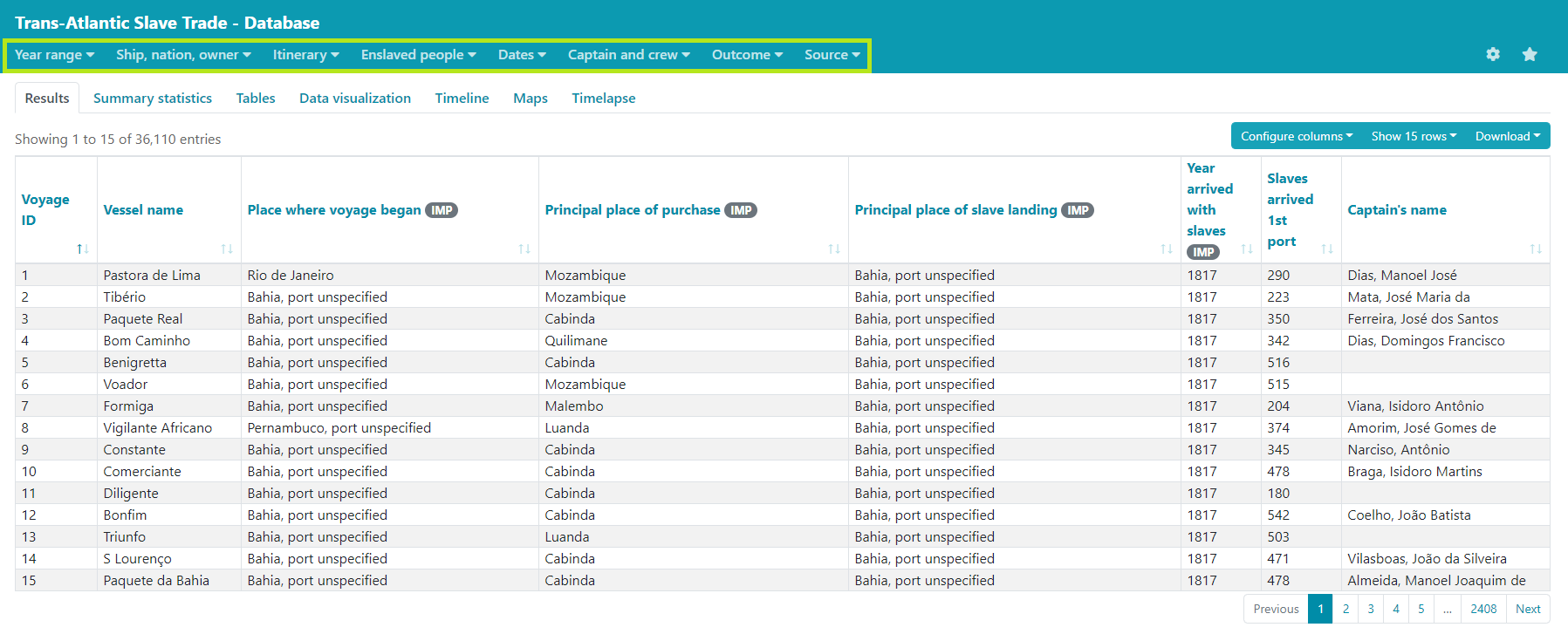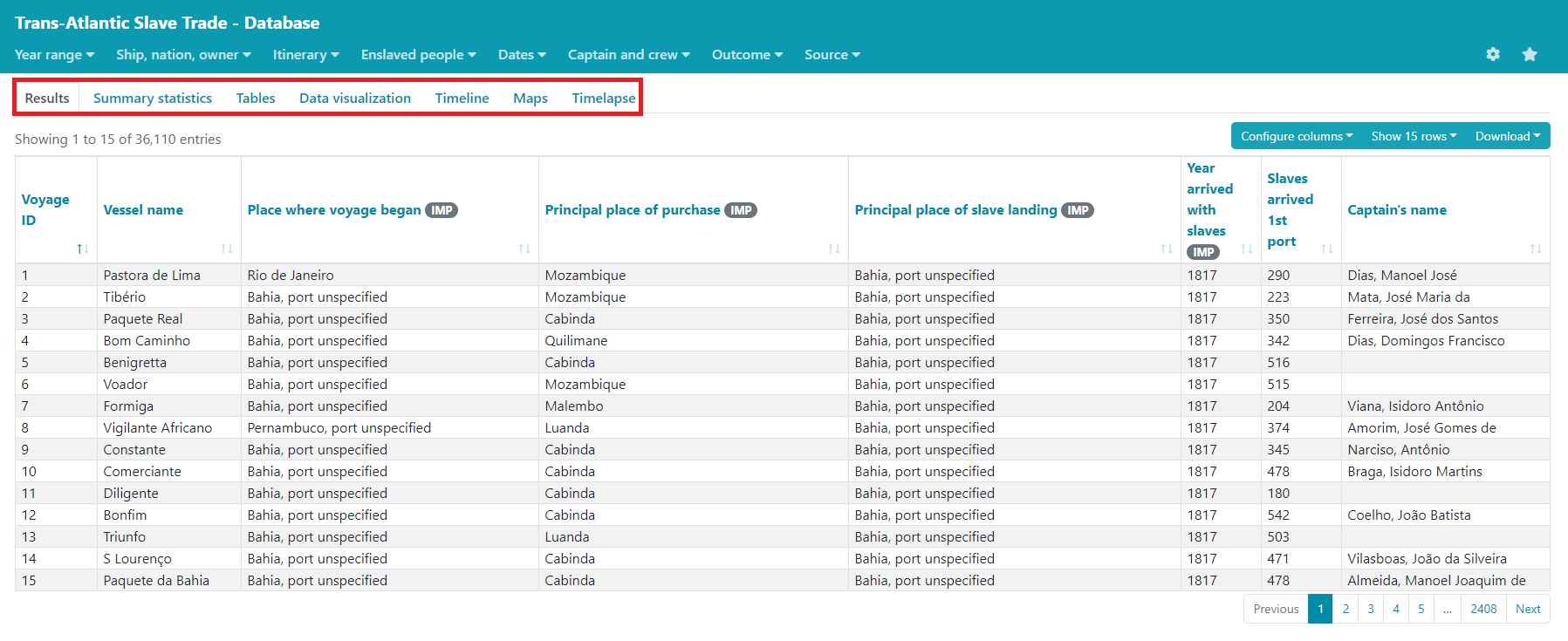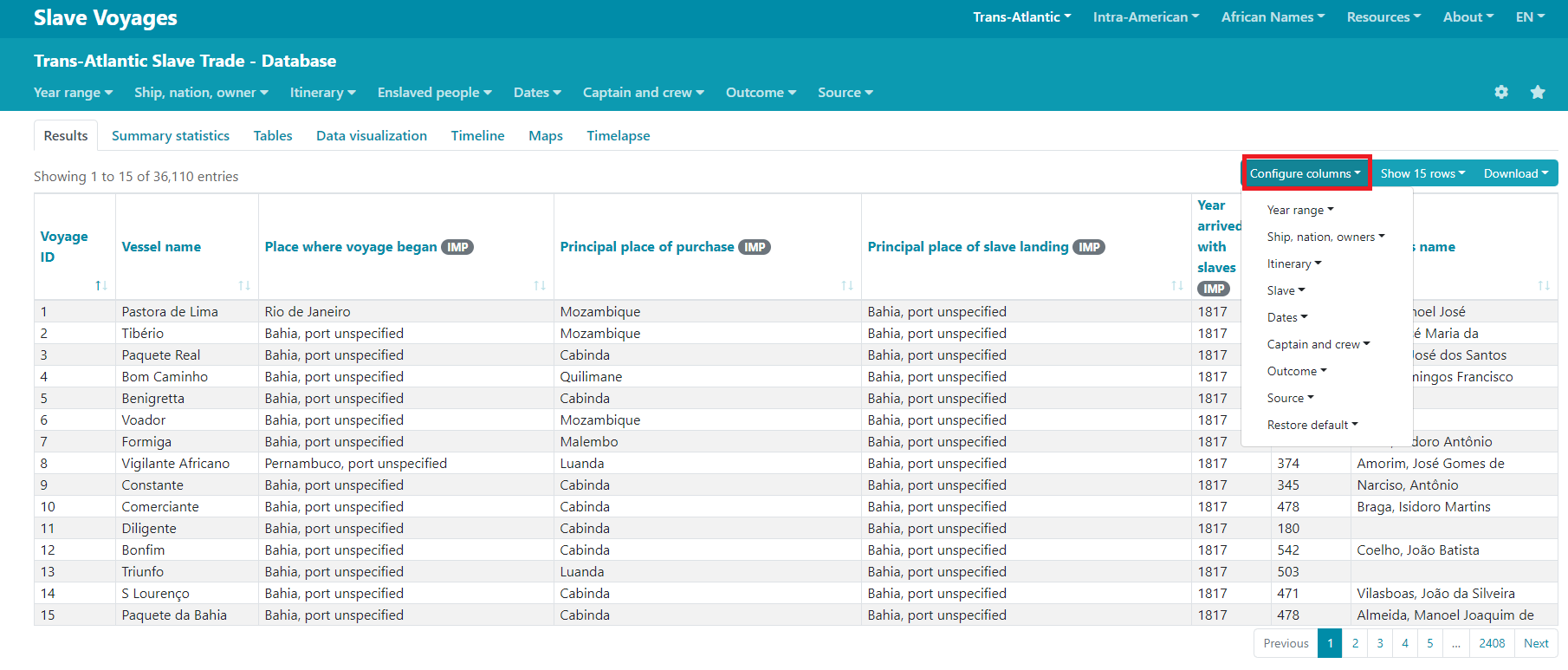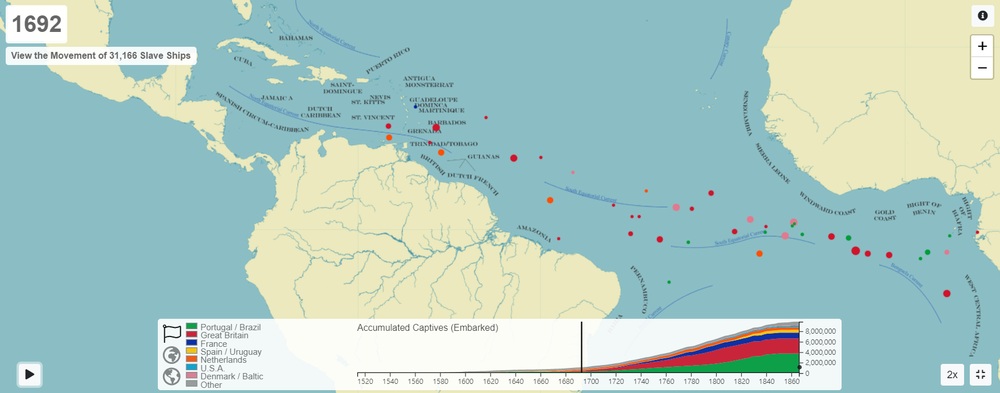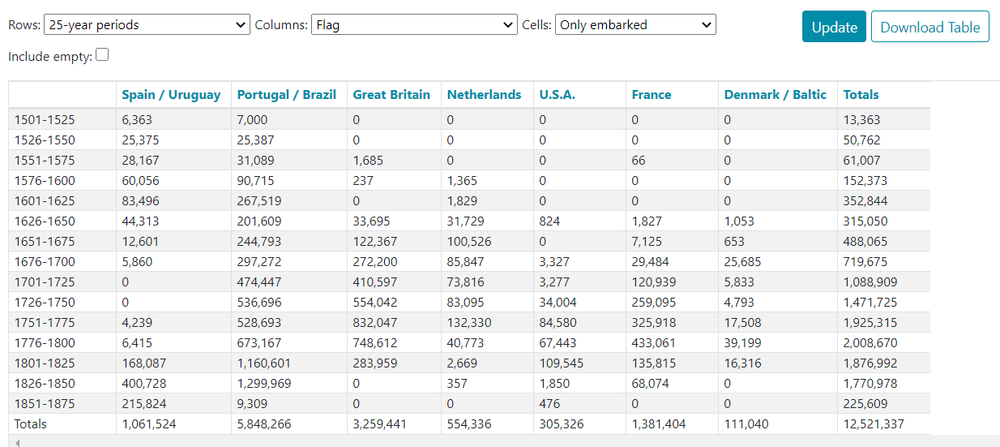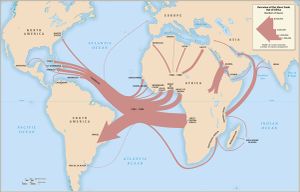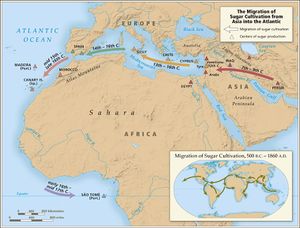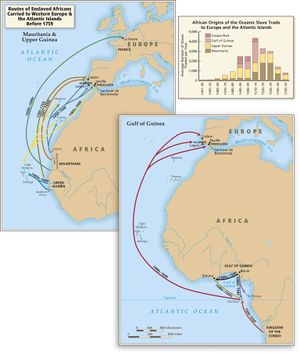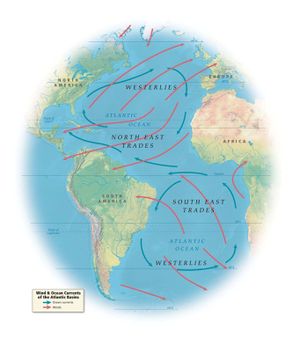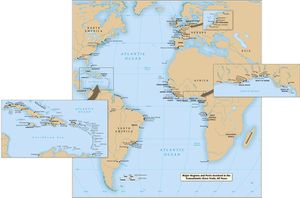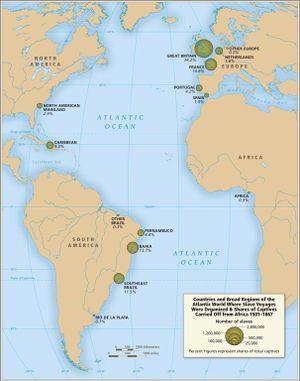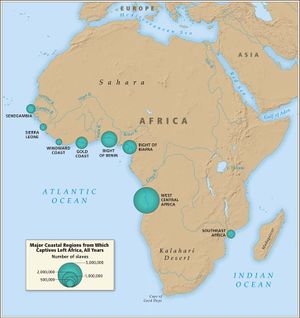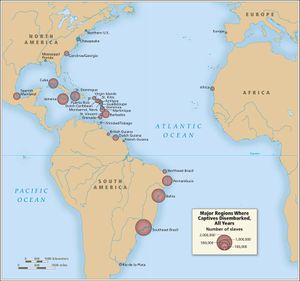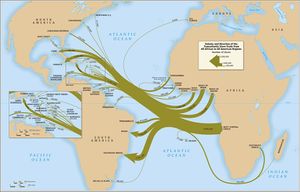Slave Voyages
red
목차
- 1 Who
- 2 When
- 3 Where
- 4 What
- 5 How(1) 데이터 수집 방법
- 6 How(2) 데이터 표시 방법
- 6.1 Trans-Atlantic
- 6.1.1 Database
- 6.1.2 Estimates
- 6.1.3 Introductory Maps
- 6.1.3.1 Map 1: 아프리카에서부터 시작하는 노예무역의 개요, 1500-1900
- 6.1.3.2 Map 2: 설탕재배의 아시아에서 대서양으로의 이동
- 6.1.3.3 Map 3: 1759년 이전에 대서양에서 이루어졌던 구세계 노예무역 경로
- 6.1.3.4 Map 4: 대서양 분지의 바람과 해류
- 6.1.3.5 Map 5: Trans-Atlantic 노예 무역과 관련된 주요 지역과 항구
- 6.1.3.6 Map 6: 노예 항해가 조직되었던 대서양 지역의 국가와 지역 (아프리카에서 수송된 노예의 수)
- 6.1.3.7 Map 7: 노예들이 떠난 아프리카의 주요 해안 지역
- 6.1.3.8 Map 8: Major regions where captives disembarked, all years
- 6.1.3.9 Map 9: Volume and direction of the trans-Atlantic slave trade from all African to all American regions
- 6.1.4 Slave ship in 3D video
- 6.2 Intra-American
- 6.3 African Names
- 6.1 Trans-Atlantic
- 7 Why
- 8 Comment
Who
2008-2015
| 소속 | 이름 | 직책(전공 분야) |
|---|---|---|
| 연구 책임자 | David Eltis Martin Halbert |
Woodruff Professor of History Digital Programs and Systems Division |
| 개발팀 | Franky Abbott Richard Arzillo Ginger Cain Angela Campbell Robin Conner Peter Carter Heather Dahl Daniel B. Domingues da Silva Erika Farr Kyle Fenton Brian Hamilton Liyuan Han Pawel Jurczyk Tomasz Jurczyk Nafees M. Khan Paul Lachance Chris LaRosa Kristine Leach Lea McLees Liz Milewicz Frank Owen Smita Patel Brian Pitts Michael Poreda Nicholas J. Radburn ChrisRoddy Katherine Skinner Joan A. Smith Alex Thomas Kathleen Turaski Hoang Vo Jelmer Vos Rik van Welie Xin Zhang Jan Zich |
Digital Programs Publicity Coordinator Research AssistantResearch Assistant |
| 운영위원회 | Stephen D. Behrendt Manolo Florentino David Richardson |
History Programme Departamento de Historia Department of History |
| 자문위원회 | Carole Hahn Herbert S. Klein Paul Lovejoy Joseph Miller G. Ugo Nwokeji Regina Werum |
Division of Educational Studies Department of History Department of History Department of History Department of African American Studies Department of Sociology |
2015-2018
| 재단 | 소속 | 이름 | 직책(전공분야) |
|---|---|---|---|
| 집행위원회 | Alex Borucki Daniel B. Domingues da Silva |
Department of History Department of History Department of History College of Education Department of History Department of History Department of History Department of History Department of History | |
| Emory NEH Award | 연구 책임자 | David Eltis Allen Tullos |
Woodruff Professor Emeritus Professor of History, and Co-Director Emory Center for Digital Scholarship |
| 개발팀 | Marcy Alexander Arya Basu |
Project Coordinator Visual Information Specialist Senior Video Producer Research Fellow Department of History Digital Specialist Lead Programmer Research Data Librarian Digital Scholarship Associate Digital Scholarship Associate Digital Scholarship Associate Data Analyst Data Architect Senior Software Engineer UI/UX Designer Systems Lead Special Projects Liaison Co-Director Geographer, GIS Specialist Lead Systems Administrator Training Coordinator, Special Projects Liaison Post Award Specialist Director of Finance | |
| University of California NEH Award | 연구 책임자 | Alex Borucki Gregory E. O'Malley |
Associate Professor, Department of History Associate Professor, Department of History |
| 개발팀 | Marcy Alexander Katherine Cosby |
Project Coordinator Research Assistant Lead Programmer Research Assistant Data Architect Research Assistant Senior Software Engineer, UI/UX Designer Research Assistant Research Assistant Research Assistant | |
2019-현재
| 소속(팀) | 이름 | 직책(전공 분야) |
|---|---|---|
| 집행위원회 | Alex Borucki Daniel B. Domingues da Silva |
Department of History Department of History Department of History College of Education Department of History Department of History Department of History Department of History Department of History ex officio ex officio |
| Intra-American Slave Trade Database | Alex Borucki Gregory E. O'Malley |
Department of History Department of History |
| Past(Origin) | Daniel B. Domingues da Silva Philip Misevich |
Department of History Department of History Professor of History |
| Trans-Atlantic Slave Trade Database | Daniel B. Domingues da Silva Nicholas Radburn |
Department of History Department of History |
| Video | Arya Basu Steve Bransford |
Visual Information Specialist II Senior Video Producer Digital Visualization Fellow College of Education Department of History School of History, Classics and Archaeology Professor of History |
| 자문위원회 | Stephen Behrendt David Eltis |
History Programme Professor of History Department of History Department of History |
| 기술 / 인프라 지원 | Domingos Dellamonica Jr. W. Terry Hardgraves |
Programmer Data Analyst Data Architect Senior Software Engineer, UI/UX Designer Systems Lead Co - Director Lead Systems Administrator |
| 프로젝트 책임자 | Marcy Alexander |
When
| 연도 | 인물 | 작업 |
|---|---|---|
| 1960년대 후반 | Herbert S. Klein and other scholars | 출판되지 않은 소스들로부터 노예무역 데이터를 수집하여 기계가 판독 가능한 형식으로 코딩하기 시작하였다. |
| 1970~80년대 | Scholars | 다수의 노예선 데이터 세트를 만들었다. |
| 1980년대 후반 | Scholars | 대략 11,000개의 대서양 횡단 항해기록을 가진 16개의 데이터 세트를 만들었다. 각 데이터 세트의 기초는 특정 유럽 국가, 또는 노예 항해가 시작된 특정 항구의 기록이었다. |
| 1990년대 초반 | David Eltis and Stephen Behrendt | 대서양 횡단 노예 항해의 단일 다중 소스 데이터 세트를 만드는 아이디어를 냈다. |
| Maurice Schofield, David Richardson | 18세기 중반 리버풀 대규모 해운 사업에 대한 다중소스 작업에 착수하였다. 이 작업을 통해 처음으로 거대 영국 노예 무역에 대한 기록을 통합할 수 있었으며, 그 이후 네덜란드, 프랑스 및 포르투갈 데이터까지 추가로 고려하여 전체 무역에 대한 단일 데이터 세트를 수집하였다. | |
| 1990년대 후반 (~1999) | Johannes Postma, Stephen Behrendt, Richardson, Beedham, and Schofield | 네덜란드, 1779년 이후 영국 무역 데이터, 1787년 이전 리버풀 플랜테이션 등록 데이터 등이 모두 기계가 판독 가능한 형식으로 정리되었다. 또한 출판 형태로만 이용가능했던 데이터들이 이용가능해 짐에따라 프로젝트의 인식이 높아졌고, 기존 연구에 참여하지 않았던 다른 학자들도 가지고 있던 데이터를 제공해주었다.[1] |
| 2001~ 2005년 | Scholars | 대서양 유역 주변 포르투갈, 스페인어권에서 대규모 연구가 수행되었다. 한편, 2000년 이전의 데이터가 인상적이기는 하였으나 60%이상이 사용할 수 없는 정보였기 때문에 더 많은 데이터를 수집하기 위해 노력했다. |
| 2006~2008년 | Scholars | 계속되는 연구와 함께 이시기 Slave Voyage 팀은 연구를 공개하는데에 힘썼다. 첫 번째 웹사이트가 2008년 12월 5일에 공개되었으며 거래 규모, 방향에 대한 추정만이 아닌 세 가지 다른 종류의 데이터에 대한 검색 인터페이스를 개발하였다.[2] |
| 2015~ 2018년 | Scholars | Slave Voyage 사이트에 대한 재코딩, 사용자 인터페이스의 현대화를 수행했다. 또, 미국 내 노예무역에 대한 새로운 데이터베이스 , 두 가지 새로운 애니메이션 기능, 스페인어와 포르투갈어 번역을 추가했다. |
Where
What
36,110건의 Trans-Atlantic 항해 데이터, 11,547 건의 Intra-American 항해 데이터,
그리고 91,491 건의 African Names 데이터.
그 통찰과 연구방법을 담은 에세이 수록.
데이터 가공 및 시각화 인터페이스는 How에서 다룸.
Trans-Atlantic
Database
Variables의 수
Variables의 종류
Data variables
| 카테고리 | 특징 및 목록 |
|---|---|
| Year range | 노예들이 도착한 해를 기준으로 정리되었다. |
목록:
| |
| 선박의 특징 | 선박의 이름, 주인, 선박이 만들어지고 등록된 시간과 장소, 국적, 돛대의 종류, 톤수(적재량), 총기류 적재량에 대한 정보이다. |
목록:
| |
| Itinerary of the voyage | Voyage가 시작되고 끝난 장소, 노예 거래가 일어난 장소, 노예가 도착한 장소가 해당된다. |
목록:
| |
| Enslaved people의 특징 | 91,491명의 노예들의 이름, 개인정보를 포함한다. 나이와 성별, 사망률에 따라 하위 variables를 나눴다. |
목록:
| |
| 출발, 도착일자 | 선박이 출발하고 도착한 일자를 바탕으로 중간 항로와 여정의 길이를 파악했다. 노예 거래가 시작되고 여정이 마무리되는 일자까지 포함한다. |
목록:
| |
| 선장 및 선원 | 선장의 이름과 voyage 전후의 선원의 수에 대한 정보이다. |
목록:
| |
| Voyage의 결과 | 다양한 voyage의 결과들에 대한 정보이다. 노예와 주인의 입장에서 voyage의 결과, captured ship의 결과, 아프리카인의 저항이 있다. |
목록:
| |
| 기록의 출처 | 기록의 출처를 source type, reference로 구분하여 작성했다. |
Imputed variables
| 카테고리 | 특징 |
|---|---|
| Flag IMP | National carrier |
| Slaximp | Total slaves embarked |
| Slamimp | Total slaves disembarked |
| Year IMP | year arrived with slaves |
| places | Voyage가 시작된 장소, 노예거래가 진행된 장소, 하선한 장소가 해당된다. |
| embarked or disembarked captives | geographic data, imputed voyage dates, numbers of captives |
Essays
Trans-Atlantic 노예 무역에 관한 에세이들을 주제별로 게재함.
Interpretation
- A Brief Overview of Trans-Atlantic Slave Trade.David Eltis.Emory University.(2007)
- Seasonality in the Trans-Atlantic Slave Trade.Stephen D. Behrendt.Victoria University of Wellington.(2008)
- Dobo: A Liberated African in Nineteenth-Century Havana.Oscar Grandio Moranguez.York University
- A Note on the Voyage of Venture Smith.David Eltis & Paul Lachance.A Note on the Voyage of Venture Smith and the Historical Record of Transatlantic Slave Trading
Vignettes
- Ayuba Suleiman Diallo and Slavery in the Atlantic World.Daniel Domingues da Silva.Emory University.(2007)
- Catherine Zimmermann-Mulgrave: A Slave Odyssey.Daniel Domingues da Silva.Emory University.(2007)
Research Notes
Intra-American
Database
Variable의 종류
Data variable
Intra-American의 database에는 Trans-Atlantic의 dataset와 동일한 variable을 적용했다.
Intra-American의 추가적인 variable은 온라인으로 제공되지 않고, 다운로드만 가능하다.
추가적인 variable은 다음과 같다.
| VoyageID2 | Intra-American voyage에 승선한 사람들 중 transatlantic voyage에서도 찾을 수 있는 사람이 있다. Multi-stage journey에 해당하는 사람들에 대한 정보이다. |
| AfrInfo | 노예들의 origin에 대한 정보이다. |
| other_Cargo | 노예들과 함께 운반된 다른 cargo에 대한 정보이다. |
Imputed variable
Essays
African Names
Database
Resources
How(1) 데이터 수집 방법
Sources
- 참고문헌의 상호 보완성:
이미 출판되어 있는 단행본 자료에서 다룬 데이터 건에 대하여 추가적인 검증을 하지는 않음
Johannes Postma(네덜란드) 등의 저작이 대표적임. 저작물들에 포함된 항해 데이터는 추가적인 검증 없이 단일 자료 참조.
그 이유는 각국의 저작물들이 다룬 데이터가 대체로 겹치기 때문. 전체 데이터 셋의 60% 이상에 해당하는 데이터가 3개 이상의 문서를 참조함.
단행본, 논문, 사유 기록물과 신문 1,022편의 문서를 참조했음.
- 일관성 획득의 어려움:
데이터에 풍성함에 비해 일관성은 상대적으로 떨어짐. 한 항해에 대하여 여러 문헌이 다른 증언을 하는 경우가 빈번함.
당시의 시대상을 고려할 때 완전히 일관적인(clean) 데이터 정리는 불가능.
그러나 연구진은 최대한의 일관성을 추구하여 다량의 데이터를 삭제했음.
그러나 완벽한 수준의 일관성 획득은 사실상 불가능 함.
- 합리적 추론:
몇 가지 기준을 통해 목적이 불분명한 선박들 중 trans-Atlantic의 노예선으로 분류할 수 있을 데이터를 선별함.
1) 역사적 맥락
-19세기 이전에는 노예교류가 아니라면 아메리카에서 아프리카로 배가 이동하는 경우 드물었음.
- 담배가 크게 유행하던 18세기에 담배를 주로 교류하던 브라질의 선박이 노예선일 가능성이 높음.
2) 더 큰 배로 노예들을 수송하는 부속선의 존재 -직접 대서양을 건너지 않음.
3) 배의 항해기록, 선장의 알려진 활동, 선박의 용적 톤수에 비해 부족한 선원의 수 - 상품수송선을 판별함.
전체 데이터의 5%가 출항 이후의 활동에 대한 기록이 부족하며 이 데이터는 다른 파일에 분리되어 보관되어 있음
Cases and Variables
- 변인 설정:
현재 데이터 셋의 변인 목록은 지난 10년 간의 무수한 수정을 거쳐 완성됨.
앞으로도 의심의 여지 없이 수정될 것. 변인 목록은 연구 경향의 변화에 따라 언제든 재편될 수 있음.
- Case:
데이터 셋의 일개 항목은 일개 항해에 대응함. 각각 고유의 ID 번호를 부여함. (VOYAGEID)
Trans-Atlantic이나 Intra-American의 범주에 포함하기 애매한 항해들이 존재했고, 각각을 데이터 셋에 포함시킬 지 여부를 결정할 기준(limit)을 설정했음.
연구팀은 타 연구자들은 이 기준에 불만족할 경우 자체적인 기준을 재설정하기를 권장함.
- Data Variables:
데이터 변인은 참조 문헌들이 담고 있는 정보를 최대한 포괄할 수 있도록 광범위하게 지정됨.
| Variable Category | 수집 방법 및 특징 |
|---|---|
| Age & Sex | 연령, 성별을 나누는 세 개의 기준을 둠. 1)성별, 연령의 순서쌍에 의한 구분-Men,Women,Boys,Girls 2)성별에 의한 구분-Males, Females 3)연령에 의한 구분-Adults,Children 연령 카테고리는 부정확하다. 각 노예무역 회사마다 달랐던 'children'의 나이 기준, 정확한 나이를 중시하지 않는 유럽 문화, 시각적으로 나이를 판별하기 어려웠던 아프리카인들의 외모 등의 이유로 연령 카테고리는 불분명할 수 밖에 없음. |
| Dates | 비영국 함선의 항해일 경우 'date of departure'은 보통 함선이 출항한 날짜를 의미함. 영국 함선도 비슷한데, 영국 함선의 출발일은 보통 선원들의 봉급이 입력된 날짜임. 위 내용은 다양한 문헌이 지지함. 새로 발견된 '출발일' 정보들은 다음과 같음. 1)함선의 세관 통과일 2)지중해 통행권 발급일 3)노예증서 발급일 4)항해사 봉급 지급일 5)함선 등록일 위 날짜들은 보통 출발 한두 달 전임. |
| Names | 함선, 선원, 상인, 함선 주인 등의 이름은 오기의 증거가 명확할 경우(기록 담당자가 기록 대상의 모국어를 유창하게 하지 못했음이 자명한 경우 등)를 제외하고는 문헌의 철자 그대로를 데이터로 반영함. |
| Voyage Outcomes | 항해 결과를 나누는 세 개의 기준을 둠 1)노예 관점에서의 항해결과-Outcome of voyage for slaves(FATE2) 2)포획된 선박의 항해결과-Outcome of voyage if ship captured(FATE3) 3) 소유주 관점에서의 항해결과-Outcome of voyage for owner(FATE4) |
Imputed Variables
How(2) 데이터 표시 방법
Trans-Atlantic
Database
상세 검색
Year range
Ship, nation, owner
Ship, nation, owner는 4개의 하위항목으로 되어 있다.
- Voyages and vessels
Voyage ID number and information about the vessel
voyage의 고유 ID 수와 선박의 이름과 주인을 입력할 수 있다.
- Construction and registration
The year and location of slave ship construction and registration
- Flag
The flag (nationality) of the slave ship
- Rig, tonnage, and guns mounted
Additional variables about slave ships
선박의 용도, 톤수, 총기류 운반량을 선택할 수 있다.
Itinerary
Itinerary는 5개의 하위 항목으로 되어 있다. Africa, Mainland North America, Spanish Mainland Americasm Caribbean, Europe, Brazil, 기타로 구분되어 있어 구체적인 장소를 선택할 수 있다.
- Place of departure
Locations where the voyage began
- Place of purchase
Locations where captives embarked
Slave purchase가 일어난 principal, 1st, 2nd, 3rd place를 검색할 수 있다.
- Places of call before Atlantic crossing
- Place of landing
Locations where captives disembarked
Slave landing 일어난 principal, 1st, 2nd, 3rd place를 검색할 수 있다.
- Place where voyage ended
Enslaved people
Enslaved people은 5개의 하위항목으로 되어 있다.
- Overall numbers
Embark한 전체 인원, disembark한 전체 인원을 검색할 수 있다.
- Purchase numbers
Number of slaves purchased
노예로 팔린 사람들의 수를 slaves intended at 1st place, slaves carried from 1st port, slaves carried from 2nd port, slaves carried from 3rd port로 나누어 설정할 수 있다.
- Landing numbers
Number of slaves landed
첫번째, 두번째, 세번째 항구에 도착한 노비의 수를 각각 지정할 수 있다.
- Percentage by sex and age
male, female, boys, girls, child를 percentage별로 입력하여 원하는 데이터를 열람할 수 있다.
- Other characteristics
아메리카에서 사람들이 팔린 평균 가격 정보인 sterling cash price in Jamaica, 중간 경로에서 죽은 노비의 수, 바다에서 죽은 사람들의 비율(mortality rate) 등 추가적인 정보를 입력할 수 있다.
Dates
Dates는 2개의 하위항목으로 되어 있다.
- Voyage duration
Middle passage, voyage length를 일(day) 단위로 입력하여 찾아볼 수 있다.
- Dates during voyage
YYYY/MM/DD 형식에 맞춰 year of arrival at port of disembarkation, date that voyage began, date trade began in Africa, date vessel departed/arrived, date vessel departed for homeport, date voyage completed를 입력할 수 있다.
Captain and crew
선장의 이름을 구체적으로 검색할 수 있고, 선원의 경우에는 수치로만 설정할 수 있다.
Voyage outset에서의 선원의 수, first landing of slaves에서의 선원의 수, 항해 도중 사망한 선원의 수를 지정할 수 있다.
Outcome
Particular outcome of voyage는 200여 개의 항목, outcome of voyage for slaves는 7개의 항목, outcome of voyage if ship captured는 15개의 항목, outcome of voyage for owner는 4개의 항목, African resistance는 7개의 항목에서 선택할 수 있게 되어 있다. [3]
Source
데이터의 출처를 직접 입력하여 원하는 정보를 열람할 수 있다.
결과
Results
Results는 상세 검색 조건에 따라 검색된 데이터를 표로 나타낸 창이다.
좌측의 Configure columns에서 원하는 정보를 열에 표시하도록 설정할 수 있다. Configure columns에는 상세 검색에서 설정한 항목들(Year range/Ship, nation, owners/Itinerary/Slave/Dates/Captain and crew/Outcome/Source/Restore default)이 있다.
Summary statistics
전체 결과 중 7개 주요 항목이 요약된 페이지이다.
Slaves embarked, Slaves disembarked, Percentage of slaves embarked who died during voyage, Length of Middle Passage (in days), Percentage male, Percentage children, Tonnage of vessel에 대해 total slaves, total voyages, average, standard deviation을 수치로 제시했다.
Tables
| Row | Flag, (Broad) region where voyage began, Port where voyage began, Embarkation regions, Principal place of purchase, Regions of disembarkation, Principal place of landing, Individual years, 5, 10, 25, 50, 100-year periods |
| Column | Flag, (Broad) region where voyage began, Port where voyage began, Embarkation regions, Principal place of purchase, Regions of disembarkation, Principal place of landing |
| Cell | Number of voyages, Sum of embarked/disembarked slaves, Average number of embarked/disembarked slaves, Percent of embarked/disembarked slaves, Average percentage male, Average percentage children, Average percentage of slaves embarked who died during voyage, Average middle passage, Average standardized tonnage, Sterling cash price in Jamaica |
Data visualization
데이터베이스를 바탕으로 세 가지 그래프를 제공한다.
XY Scatter Plot
X축, Y축 변수를 설정하면 자동으로 꺾은선 그래프를 출력함.
X축 입력 가능 변수는 7개, Y축 입력 가능 변수는 21개.
| X축 지원 variable 항목 | Y축 지원 variable 항목 |
|
|
Bar chart
X축, Y축 변수를 설정하면 자동으로 막대그래프를 출력함.
X축 지원 변수는 25개, Y축 지원 변수는 21개.
| X축 지원 variable 항목 | Y축 지원 variable 항목 |
|
|
Donut chart
Sector 항목과 Value 항목을 입력하면 자동으로 원형그래프 출력.
원형그래프는 'Value'에 대한 'Sector'의 비율을 표시
Sector 지원 변수는 25개, Value 지원 변수는 21개
| Sector 지원 variable 항목 | Value 지원 variable 항목 |
|
|
Timeline
21개의 variable 중에서 원하는 것을 선택하여 plot을 작성하는 기능이다. 작성된 plot에 대해서는 추가로 print, download 기능이 제공된다.
선택가능한 Variable에는 number of voyages, average tonnage, average number of guns, rate of resistance, average duration of voyage, average duration of middle passage, average crew at outset, average crew at first landing of slaves, average crew death, total number of slaves embarked 등이 있다.
Maps
지도 상에 slave voyage의 항로를 표시한 것이다. 항로를 클릭하면 Broad regions, Africans arriving from Africa, Africans carried off가 적힌 통계창이 뜬다.
아프리카에서 출발하여 대서양을 거쳐 유럽, 북아메리카 본토, Spanish Circum-Caribbean, 브라질로 향하는 항로들이다.
Timelapse
31,166척의 노예 선박이 이동한 경로를 영상화하였다. 선박 하나가 점 하나에 대응하며, 도착지에 따라 점의 색이 다르다. 또한 선박에 탄 captives의 수에 따라 점의 크기를 달리했다.[4]
Estimates
Time frame, Flag, Regions(embarkation/disembarkation)을 변인으로 하여 Tables, Timeline, Map 세 가지 형식으로 데이터를 시각화함. 메인 데이터베이스와 비슷한 구조로 데이터를 시각화하나 변인이 설정된 기준이 조금 다르며 보다 간결하고 직관적인 자료를 제공한다. 항구에 대한 데이터는 제공되지 않는다. 변인을 상세하게 조작할 수 있는 좌측의 filter 기능을 통해 자료를 변형할 수 있다.
Tables
행, 열, 셀에 적용하고 싶은 카테고리를 지정하여 표를 재구성할 수 있다.
| rows | time frame | individual years, 5-year period, 10-year period, 25-year period, 50-year period, 100-year period |
| region | embarkation regions, broad disembarkation regions, specific disembarkation regions | |
| flag | flag | |
| columns | region | embarkation regions, broad embarkation regions, specific disembarkation regions |
| flag | flag | |
| cells | embarked/disembarked, only embarked, only disembarked | |
Timeline
Maps
Timelapse
Introductory Maps
Map 1: 아프리카에서부터 시작하는 노예무역의 개요, 1500-1900
아프리카의 노예들은 여러 경로를 통해 세계 각 곳으로 흩어졌다. 이 지도는 1500년부터 1900년 사이에 이루어졌던 trans-Atlantic 노예무역의 움직임을 보여준다. Ocean-borne 무역에 대한 추정치는 trans-Safaran, Red Sea, and Persian gulf 경로에 대한 추정치보다 거대하다. but it is thought that for the period from the end of the Roman Empire to 1900 about the same number of captives crossed the Atlantic as left Africa by all other routes combined.
Map 2: 설탕재배의 아시아에서 대서양으로의 이동
설탕 재배는 그리스도교 이전 시대에 태평양에서 시작했고 지중해 동부 국가, 기니만, 브라질로 점진적으로 확대되어 17세기 중반에는 카리브해에 이르렀다. 아프리카에서 온 노예들의 80%는 설탕 재배 지역으로 인도되었다.
Map 3: 1759년 이전에 대서양에서 이루어졌던 구세계 노예무역 경로
대서양 노예무역이 시작되기 전과 그 후 2세기 동안에 몇몇 아프리카 노예들은 유럽과 대서양의 섬으로 이동했고 아프리카 항구들 간에 이동했다. 이 흐름에 대한 정밀한 추정치를 구할 수는 없지만 trans-Atlantic의 수송량에 비해서는 확연히 적었다. 이 노예들 또한 나중에 구세계의 설탕 농장으로 옮겨졌다.
Map 4: 대서양 분지의 바람과 해류
항해시대에는 바람과 해류가 효율적으로 trans-Atlantic 노예무역의 방향을 결정했다. 유럽과 북아메리카에서 시작하는 항해를 안내하는 북쪽 흐름과 브라질에서 시작하는 항해를 안내하는 남쪽 흐름으로 두 개의 분리된 노예 무역 체계를 효율적으로 형성했다.
Map 5: Trans-Atlantic 노예 무역과 관련된 주요 지역과 항구
노예 무역의 영향을 받지 않았던 대서양 지역의 상업중심지는 거의 없었고 모든 주요 항구는 노예 무역의 흐름과 긴밀하게 연결되어 있었다.
Map 6: 노예 항해가 조직되었던 대서양 지역의 국가와 지역 (아프리카에서 수송된 노예의 수)
trans-Atlantic 노예 무역이 4세기 동안 이루어지면서 노예 항해는 대서양의 모든 주요 항구에서 어느 시점에는 구성되고 시작되었다. 그럼에도 불구하고 가장 큰 7개의 항구 ( Rio de Janeiro, Bahia, Liverpool, London, Nantes, Bristol, and Pernambuco)에서 출발한 선박들이 아프리카에서 대서양으로 옮겨진 모든 노예의 거의 75%를 운송했다. 노예 항해를 구성함에 있어서 처음에는 이베리아 반도에서 북유럽으로, 그리고 후에 남유럽으로 중요한 변화가 일어났다. 남에서 북으로 그리고 북에서 남으로 이동했던 아메리카의 변화는 이와 비슷하지만 덜 확연하다.
Total documented embarkations: 8,973,701 captives
Percent of estimated embarkations: 72.1%
Map 7: 노예들이 떠난 아프리카의 주요 해안 지역
이 지역의 경계는 'Senegambia'이다. 'Sierra Lieone'은 'Cape Mount'에 약간 못 미치는 'Rio Nunez'로 구성되어 있다. 'Windward Coast'는 'Assini River'을 포함한 남동쪽의 'Cape Mount'으로 정의된다. 'Gold Coast'는 'Volta River'를 포함한 이 그림의 동쪽으로 뻗어나간다. 'Bight of Benin'은 'Rio Volta'에서 'Rioo Nun'까지, 그리고 'Bight of Biafra'는 'Nun'의 동쪽에서 'Cape Lopez'까지 포괄한다. 서중부 아프리카는 'Bight of Benin'의 남쪽 대륙의 서쪽 해안과 희망봉 북쪽과 동쪽의 어느 지점에서의 남동부 아프리카로 정의된다. 서중부 아프리카는 대부분의 노예 교역 시대에 노예들의 가장 큰 지역적인 출발 지점이었다. 아메리카와 유럽에 더 가까운 지역에서는 상대적으로 적은 수의 노예들이 대서양을 건너 이동되었다. 항해 기간은 승선항구와 하선 항구의 상대적 근접성만큼 지도4에 나타난 바람과 해류에 의해서도 크게 결정되었다.
Total documented embarkations: 7,878,500 captives
Percent of estimated embarkations: 63.3%
Map 8: Major regions where captives disembarked, all years
The Caribbean and South America received 95 percent of the slaves arriving in the Americas. Some captives disembarked in Africa rather than the Americas because their trans-Atlantic voyage was diverted as a result of a slave rebellion or, during the era of suppression, because of capture by patrolling naval cruisers. Less than 4 percent disembarked in North America, and only just over 10,000 in Europe.
Total documented embarkations: 9,371,001 captives
Percent of estimated embarkations: 88.5%
Map 9: Volume and direction of the trans-Atlantic slave trade from all African to all American regions
This map summarizes and combines the many different paths by which captives left Africa and reached the Americas. While there were strong connections between particular embarkation and disembarkation regions, it was also the case that captives from any of the major regions of Africa could disembark in almost any of the major regions of the Americas. Even captives leaving Southeast Africa, the region most remote from the Americas, could disembark in mainland North America, as well as the Caribbean and South America. The data in this map are based on estimates of the total slave trade rather than documented departures and arrivals.
Slave ship in 3D video
노예선 L'Aurore를 3D 비디오로 재건했다.
Intra-American
Database
상세검색
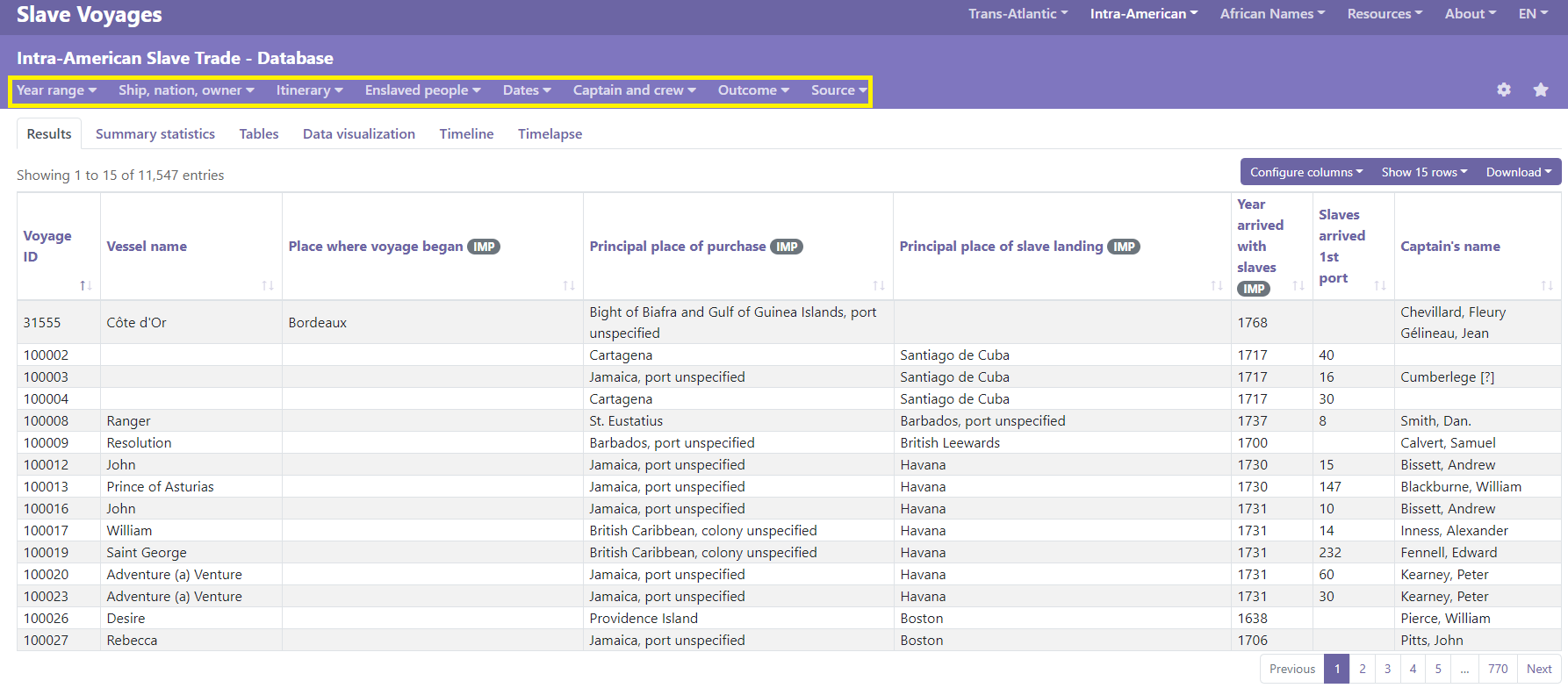 Intra-American slave voyage의 데이터베이스에서는 Trans-Atlantic과 마찬가지로 상세검색 기능을 제공한다. 상세검색 항목은 Trans-Atlantic과 동일하다.
Intra-American slave voyage의 데이터베이스에서는 Trans-Atlantic과 마찬가지로 상세검색 기능을 제공한다. 상세검색 항목은 Trans-Atlantic과 동일하다.
Year range
Ship, nation, owner
Ship, nation, owner는 4개의 하위항목으로 되어 있다.
- Voyages and vessels
Voyage ID number and information about the vessel
voyage의 고유 ID 수와 선박의 이름과 주인을 입력할 수 있다.
- Construction and registration
The year and location of slave ship construction and registration
- Flag
The flag (nationality) of the slave ship
- Rig, tonnage, and guns mounted
Additional variables about slave ships
선박의 용도, 톤수, 총기류 운반량을 선택할 수 있다.
Itinerary
Itinerary는 5개의 하위 항목으로 되어 있다. Africa, Mainland North America, Spanish Mainland Americasm Caribbean, Europe, Brazil, 기타로 구분되어 있어 구체적인 장소를 선택할 수 있다.
- Place of departure
Locations where the voyage began
- Place of purchase
Locations where captives embarked
Slave purchase가 일어난 principal, 1st, 2nd, 3rd place를 검색할 수 있다.
- Places of call before Atlantic crossing
- Place of landing
Locations where captives disembarked
Slave landing 일어난 principal, 1st, 2nd, 3rd place를 검색할 수 있다.
- Place where voyage ended
Enslaved people
Enslaved people은 5개의 하위항목으로 되어 있다.
- Overall numbers
Embark한 전체 인원, disembark한 전체 인원을 검색할 수 있다.
- Purchase numbers
Number of slaves purchased
노예로 팔린 사람들의 수를 slaves intended at 1st place, slaves carried from 1st port, slaves carried from 2nd port, slaves carried from 3rd port로 나누어 설정할 수 있다.
- Landing numbers
Number of slaves landed
첫번째, 두번째, 세번째 항구에 도착한 노비의 수를 각각 지정할 수 있다.
- Percentage by sex and age
male, female, boys, girls, child를 percentage별로 입력하여 원하는 데이터를 열람할 수 있다.
- Other characteristics
아메리카에서 사람들이 팔린 평균 가격 정보인 sterling cash price in Jamaica, 중간 경로에서 죽은 노비의 수, 바다에서 죽은 사람들의 비율(mortality rate) 등 추가적인 정보를 입력할 수 있다.
Dates
Dates는 2개의 하위항목으로 되어 있다.
- Voyage duration
Middle passage, voyage length를 일(day) 단위로 입력하여 찾아볼 수 있다.
- Dates during voyage
YYYY/MM/DD 형식에 맞춰 year of arrival at port of disembarkation, date that voyage began, date trade began in Africa, date vessel departed/arrived, date vessel departed for homeport, date voyage completed를 입력할 수 있다.
Captain and crew
선장의 이름을 구체적으로 검색할 수 있고, 선원의 경우에는 수치로만 설정할 수 있다.
Voyage outset에서의 선원의 수, first landing of slaves에서의 선원의 수, 항해 도중 사망한 선원의 수를 지정할 수 있다.
Outcome
Particular outcome of voyage는 200여 개의 항목, outcome of voyage for slaves는 7개의 항목, outcome of voyage if ship captured는 15개의 항목, outcome of voyage for owner는 4개의 항목, African resistance는 7개의 항목에서 선택할 수 있게 되어 있다. [5]
Source
데이터의 출처를 직접 입력하여 원하는 정보를 열람할 수 있다.
결과
African Names
Why
"The major aim of this web resource is to facilitate and stimulate new research on the slave trade, the implications of which reach far beyond the slave trade itself." _ Introduction 중에서.
본 연구의 주된 목적은 노예 무역에 대한 연구와 노예 무역 그 자체를 넘어선 새로운 함의 발굴을 위한 연구를 촉진하고 자극하기 위함이다.
개괄
유럽이 남,북아메리카 대륙을 식민지 삼은 1492년부터 19세기 초까지의 기간 동안 수많은 유럽인이 아메리카로 이주했다.
하지만 1820년 이전까지 그 유럽인의 세 배나 되는 수의 아프리카인들이 노예로서 대서양을 건넜고,이는 역사상 최대의 대륙간 이주였다.
따라서 노예무역과 강제 이주 아프리카인의 역사는 아메리카의 인적, 물적, 문화적 형성에 대한 필수적 요소이다.
African Names 인터페이스 제작 이유에 대한 보충 설명
첫째로 본인 가족의 역사를 찾고 있는 사람들에게 도움을 줄 수 있다.
그러나, 91,491 건의 데이터는 이 목적을 위해 사용하기에 턱없이 부족하다.
African Names 파트의 더 큰 목적과 기능은 아메리카 내 아프리카 이주민 역사에 대한 창의적 재구성의 실마리를 제공함에 있다.
구체적으로는 16세기 말과 19세기 중엽 사이 대서양 주변국들의 문화적, 인구통계학적, 경제학적 변화에 대한 연구를 지원한다.
노예사업, 전쟁, 정치적 불안정, 기후적 변화와 생태학적 변화를 비롯한
여러 역사적 변인들 사이의 관계변인을 탐구할 수 있는 기초적 정보를 제공한다.
African Names 인터페이스는 이미 대서양 노예무역의 인구통계학적 연구 자료의 부피 확보와 구조 확립에 기여하고 있다.
본 인터페이스는 향후 노예들을 항구로 이끈 아프리카 내부 경로를 밝혀내는 데 사용될 것이다.
Comment
- ↑ The project undertook three major tasks. The first was standardizing the existing data. Pioneers in the field had collected their data using different definitions of variables, sometimes of apparently similar items of information, as well as a range of organizational formats (for example using ship-based rather than voyage-based data). The second task was collating voyages which appeared in several different sets, converting single-source data sets into multisource equivalents and even checking on the validity of old compilations. The third task was adding new information. About half of the 27,233 voyage records subsequently published on the 1999 CD-ROM in 1999 were new.
- ↑ The web site would provide a range of ancillary material for educators including lesson plans and maps. The new site would provide an opportunity for researchers everywhere to continue to contribute their discoveries and correct errors in the data that they might find. After a peer-review process any new data or corrections are will be added to the core database at three year intervals.
- ↑ 중복 선택도 가능하다.
- ↑ 수가 많을수록 더 큰 점으로 표시했다.
- ↑ 중복 선택도 가능하다.
